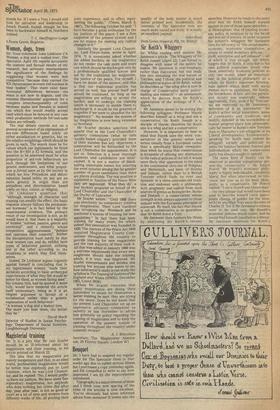Magisterial training
Sir: It is a pity that Mr lain Scarlet should be so ill-informed about lay magistrates and their training, in his article printed on March 22. The idea that lay magistrates are merely inexpensive and that, in an ideal world, professional magistrates would be better was expressly put to Lord Gardiner, when he was Lord Chancellor, and he replied: "No, I would prefer to have lay justices. We have some fine stipendiary magistrates, but anybody who does nothing but crime day after day, year after year, is not as good at court as a lot ot men and women from different walks of life, all pooling their joint experience, and in effect representing the public." . (Times, March 8, 1967). The following October he said: "I have become a great enthusiast for the lay justices of the peace. I am a firm supporter of the present system and I see no reason for making any radical changes in it."
Similarly the present Lord Chancel lor, Lord Elwyn-Jones, wrote in April 1974: 'It is sometimes asked whether the added burdens on the magistracy do riot render the task more and more one which should be discharged only by a professionally qualified lawyer and not by the traditional lay magistrate, the justice of the peace. For myself, I have no doubt of the answer, and that is that our traditional practice has served us well, has proved itself and should be continued. So long as lay magistrates are willing to accept the burden, and to undergo the training which is necessary to enable them to discharge it, it would be the greatest of tragedies if we were to abandon the lay magistracy." No wonder the system of lay magistrates is now being extended to Scotland.
Mr Scarlet derides selection and
asserts that in the Lord Chancellor's advisory committees (what he calls locally-based cliques') provided none of their number has any objections a nomination will be forwarded to the Lord Chancellor for appointment. It is not so. Selection is a most thorough business and candidates are interviewed. It is not a matter of blackballing unsuitable names but selecting the most suitable among the far greater number of good candidates than there are places available. The real position is explained in 'Justices of the Peace: How they are appointed: What they .do', a free booklet prepared on behalf of the Lord Chancellor and the Chancellor of the Duchy of Lancaster.
Mr Scarlet writes: "Until 1966 there was absolutely no compulsory training for magistrates. Then Lord Gardiner was occupying the Woolsack and he instituted a system of training for new appointees." In fact there had been' training for many years, for which indeed this association was founded in 1920. The Justices of the Peace Act 1949 required Magistrates Courts Committees throughout the country to provide training for new magistrates' and the vast majority of them took it. All that was added in January 1966 was a welcome requirement that every new magistrate should take the training which, it is true, was improved. Mr Scarlet misrepresents and derides this training but anyone who wants to see how substantial it really is can study the 'syllabus in The Training oflustices of the' England and Wales (HMSO, December 1965, Cmnd 2856). When Mr Scarlet concedes that many magistrates are doing their damnedest to obtain for themselves a better training he says they are crying for the moon. Does he not know that the present Lord Chancellor set up an impressive advisory committee as recently as last November to advise him generally on policy regarding the training of magistrates and to keep the operation of the present system of training throughout the country under constant review?
A. J. Bra yshaw Secretary, The Magistrates' Associaton, 28 Fitzroy Square, London W1










































 Previous page
Previous page